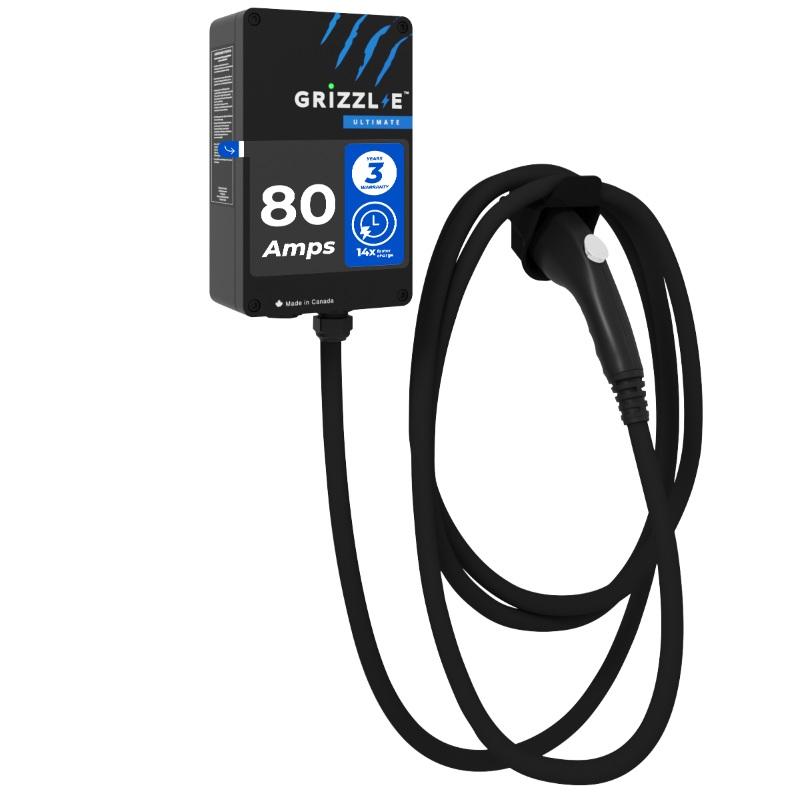
Supplying the chargers and the charge for electric vehicles (EVs) is the uncommon two-pronged business model of United Chargers Inc., a company based in the Toronto suburb of Richmond Hill.
Best known for its Grizzl-E line of Level 2 chargers, CEO Gleb Nikiforov says his company is one of the largest producers of EV chargers in Canada and the U.S., capable of manufacturing over 100,000 per year from its 36,000-square-foot facility.
The Grizzl-E Classic and Duo were recognized by the New York Times’ product review site Wirecutter as two of the best budget home EV chargers available on the market.
Its upward trajectory has been swift. United began manufacturing home chargers in 2019, Nikiforov said in an interview with Sustainable Biz Canada.
The company recently added another segment, now offering a subscription service named the Grizzl-E Club. Members are given an EV charger and are rewarded with the equivalent of $0.03 for every kilowatt-hour of charge under a federal carbon rebate program that is designed to incentivize EV adoption.
“The cost of living is going up. This program enables us to offer the best offer right away,” Nikiforov said.
Nikiforov's risky venture
Formerly in the information and communication technology sector, Nikiforov ventured into EV charging by pooling his money with a childhood friend and “risked all his lifetime savings,” as he recalled.
His first company in the EV space was Autochargers.ca, which installs EV chargers in Canada. (Autochargers.ca is now a subsidiary of United).
The company's chargers are compatible with the two major North American plug standards – J1772 and Tesla – opening its product to a broad market. The Grizzle-E Classic, a 10-kilowatt charger that can be adjusted to four amperage levels, is the company’s most popular product, Nikiforov said.
North America is United’s primary market, and the company is working to expand its reach to Latin America and Europe. Once those two regions are incorporated, Nikiforov aims to further widen its market share to Africa, Australia and Asia.
“We have a world market strategy. The goal of the company is to have our product available in every country.”
Unlike some companies in the sector that hit the pedal to the metal on growth fuelled by government subsidies and private investments, United has not taken a cent of either, he said.
Nikiforov opted to slowly grow the customer base and sales, as his goal is to keep his company growing at a manageable rate.
The company has remained profitable with this approach, Nikiforov said. So far, United has sold approximately 500,000 chargers, many directly to consumers through Amazon or a digital store on its website.
“When you are lean in manufacturing, when you don’t have extra money, then you are becoming a very lean and efficient company.”
Grizzl-E Club
While its charger sales remain stable, Nikiforov is wary of the impacts of the tariffs and trade volatility between Canada and the U.S. Mindful of the uncertainty and recognizing it cannot rely on the U.S. market, United launched Grizzl-E Club to build a stable customer base in its home country, he explained.
Tapping into a Canadian government incentive by which EV charger operators can generate and collect carbon credits, members of the club will sign up for an annual membership that costs $120 and select a desired charger.
Nikiforov likened Grizzl-E Club to Costco’s executive membership that provides a two per cent cash back for purchases. Grizzl-E Club's incentive can cover the annual subscription cost if used frequently enough.
United is covering the cost of membership for the first year of the club. To receive the charger, a security deposit will need to be paid, but will be returned to the customer once a predetermined amount of energy is consumed.
Members will be compensated the equivalent of $0.03 for every kilowatt-hour of charge, which can be converted to cash or redeemed to cover the cost of the subscription for the following year. Driving approximately 1,700 to 2,000 kilometres or more per month can fully cover the annual membership renewal cost, Nikiforov said.
“I think it’s great news for consumers and Canadians in general that EV chargers are becoming not only affordable but rewardable.”
United's turn to commercial charging
After concentrating on the home charger market, United will be turning toward commercial EV charging. United’s first two commercial chargers are expected to be launched by the end of the year.
Another major milestone is starting operations at its factory in Mexico which will supply the Latin American and Caribbean markets, and to start sales in Europe soon.










